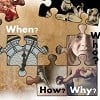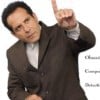Magical thinking vs Critical thinking
- Sophia Angeliqueposted 13 years ago
0
Critical thinkers are in the minority these days. Between 1900 and about 1960, critical thinking was taught at schools so that people would reject magical thinking. During the past thirty or forty years, with the decline of solid academic education, more and more people have reverted to magical thinking - the natural habitat of primitive man. Today, magical thinkers outnumber critical thinkers.
So, if you're a magical thinker, aren't you scared of our society reverting to the dark ages?
And if you're a critical thinker, how do you cope with being bludgeoned to intellectual death by magical thinkers?I took a class called "Critical Thinking" and it seems to me most people believe they ARE critical thinkers. During the class the students that struggled most with the assignments seemed to be the ones that were most convinced of their critical thinking abilities. It was kind of weird. But I think after that experience that not many people would self-identify as "magical thinkers" - or if they did, they might feel that positive thinking (or their religion, or their politics, or something else) could keep the human race moving forward.
lol, I think you just lost about 80% of the readers on HubPages Sophia.
Anyone who believes in God, the law of attraction, positive thinking, etc. is a magical thinker. If the professor of the course didn't point that out, then s/he shouldn't have been teaching that course...
The one thing I remember most about the course was an exercise where they had soldiers in a battle situation and you were supposed to figure out what to do based on limited input. (Communications were down so there was no way to get "orders" or talk to the others.) The majority of the class assumed the soldiers were "American Troops" and applied all kinds of things to the situation based on what they already thought they knew about Army training, etc. One of the main points that sticks with me is that part of critical thinking is not bringing all that baggage into a new situation - they never said if the soldiers were American or not, or even what century we were in. For all we were told, they could have been cavemen throwing rocks! But it was interesting to see how many people held firm to their opinions, even when it was the instructor pointing out the troops were not necessarily American, or even well-trained.
Good thread.
Unless money is involved, I usually just run away.Not so sure it's a good thread... Good threads have length of life. However, it does demonstrate that critical thinking isn't of much interest to many people. Very sad. Very dangerous...
I should have said, "Good op".
As to the thread, have faith! Sorry, I couldn't pass that one up.
Why must it be one or the other? Where does divergent thinking fit into these categories? How about those responsible for crazy inventions? Who would have thought we could fly? It would have seemed like a magical idea at the time. A fantasy. Carried out by very intellectual critical thinkers.
Was Newton a magical or a critical thinker? Einstein?
To classify yourself as being one or the other limits yourself intellectually. A critical thinker would not want this type of intellectual restraint.
If a magical thinker is anyone who believes in God, or superstitions then can these magical thinkers not be critical thinkers as well? Can a magical thinker survive as a University student? A teacher? A lawyer?
Hmm a philosopher?
I don't think this forum is based on critical thought at all.calynbana, you obviously have no conception of what critical thinking is. Let me demonstrate.
In the Myers Briggs test, there is a category called INTJ. It's 1% of the population, and there are the inventors, the scientists, the discoverers, etc.
They're rare because they combine logical thinking (critical thinking) with imagination. Generally, feelers don't think critically, and generally thinkers don't have imagination.
So, yes, Einstein was most definitely a critical thinker. He could not have come up with the stuff he did without being a critical thinker. He did, however, have imagination.
Put another way, it works something like this...
People who are predominantly right brained (imagination) think of big ideas but do not have the left brain (critical thinking) to bring about those ideas into reality.
Left brain thinkers have the critical thinking capacity to bring ideas into reality but don't have the imagination to think of the ideas.
In order to create new ideas, one must have both imagination and critical thinking - use both left brain and right brain equally - whole brain thinking. This is only a small percentage of the population.
http://www.soaringcreativity.com/articles/bitingual.htm
Your Quote
"Can a magical thinker survive as a university student? A teacher? A lawyer?"
It's not necessary to be a critical thinker to get through university. One can just repeat and learn everything by rote. Also, there are degrees of critical thinking. If one is 4% critical thinker and 96% magical thinker, to all intents and purposes, as our society goes, one goes with the dominant traits.
No, this forum isn't based on critical thinking at all. However, this particular thread is about critical thinking.
Here's a definition of critical thinking...
http://www.criticalthinking.org/pages/d … inking/766Okay critical thinking is a type of thought process. Spiritual thinking or as you called it magical thinking is something entirely different.
People use a critical thought process in order to create their personal belief system and opinions. I will agree that there are not many critical thinkers around anymore. That is not due to spiritual thinking, that is due to a murderous education system and an overstimulating technological environment.
There are those that blindly choose a belief system based on how they were raised. I would concede that they are not critical thinkers. There are those who chose a belief system as an adult based off of a method of critical thinking.
It is not a one or the other. In even saying that people are in fact one or the other you are demonstrating a lack of critical thought.
Again I ask you. Was Einstein a critical or magical thinker? How about Newton. I am not talking about imagination here, I am talking about brilliant men who believed there was a creator.'Spiritual thinking' is the same as 'magical thinking.'
If you're about to try and trip me up, with your question about Einstein and Newton, puh-lease.
My late father was at the same university and attended the same synagogue as Einstein. He was an agnostic. He was also a critical thinker. Most of the information on the web about him in terms of religion is erroneous.
Newton lived in a time when he didn't have the information that we have readily available today. The fact that he believed in God was the best that most people could do in that time. It was primitive and didn't have the degree of information that we have available today. Critical thinking involves examining all the information available. Newton did not have that type of information available. I'm sure that if he did have, he'd have a totally different view today.
At this point in time, it is absolutely and utterly not possible to be a critical thinker and believe in magical beings.Oh dear this is going to be a hilarious conversation.
Einstein was indeed an agnostic. Although that isn't all there is to it.
Whether or not it was a different time Newton was definitely a critical thinker. And a man who believed in God.
Now you say you are a critical thinker. May I ask you your beliefs on the origin of the Universe? I want to know what information you have used to form your critically thought out belief system.
What are your thoughts on C.S Lewis btw? Critical thinker?
How about Martin Nowak? Townes? Craig? Al Ghazli?Once again, critical thinking does not spawn beliefs or belief systems, they tend to destroy them with logic, reason, facts and evidence.
We don't know everything. When you don't understand something (say the laws of physics that allow flight) then things happen that appear magical. To believe they happen doesn't make you less critical in your thinking.
Back in the days when I went to church they talked about "spiritual laws" - just like we have "physical laws" (science). Is Karma magical thinking? It may seem like it's spiritual. But if I hurt you, then it's human nature to try to get some revenge, which I feel obligated to repay, and so on. At one time it may have been spiritual or religious to believe in karma. But now you could just as easily explain it with psychology.
I think the critical aspect of thinking comes in when you can pause from that natural flow and THINK about what you are doing, rather than just react, and see why you are acting in the way you are - what the underlying belief system is - and what the results of your actions are likely to be. Then you can make a decision about what to do based on logic rather than emotion.
Athiests can get caught up in this "magical thinking" as easily as Christians (or other religious people). They can believe in science that has not been proven, or draw conclusions about ALL people (pick your group... religious, ethnic, men, women, teens, etc) based on limited information that end up being wrong.
Part of thinking critically is to look for all the facts in a situation, and recognize when there are areas that you don't know or understand completely.Critical thinking is the ability to say 1 + 1 + 2. There is nothing magical about it. It's looking at the raw facts and drawing deductions from them.
Perhaps you should give this page another read Sophia.
http://www.criticalthinking.org/pages/d … inking/766I think critical thinking is much more than looking at facts and drawing conclusions. It includes having the ability to look and observe and creatively solve problems. Sometimes what may be referred to as 'magical' thinking can be incorporated with critical thinking skills and has been since time began.
I don't believe thinking needs classification. Cognitive skills are taught and learned by practice over and over again. Too many people simply don't think. We let thoughts and images go through our mind.
Critical thinking is still taught in schools, as early as preschool.RebekahELLE
Magical thinking is different to imagination. Critical thinking is the ability to take any problem, issue, whatever, and break it down into its raw components without there being contradictions or matters of 'faith' in it.
For instance, if I say, "There is no evidence that the bible is exactly as it was written 2000 years ago," it would involve chucking out anything that was an issue of faith. If one is a critical thinker, one cannot say, "Oh, but it's God's words, therefore it must be perfect, and it must be exactly the way it was written in the beginning." That is not critical thinking.
Next critical thinking and creativity are two different things. Critical thinking may be a component of creativity, but that doesn't mean that critical thinking may have to involve creativity.
Next, creativity does not involve magical thinking. It is, for instance, absolutely impossible to create technology using magical thinking. I'm going to repeat this: imagination is NOT magical thinking.Okay, so an example of magical thinking - "If I believe hard enough it will happen." (aka "The Secret", and also the way I was taught people get to heaven.)
As opposed to imagination - "thinking out of the box."
So being creative or imaginative is not the same as believing that things will just happen because you want them too, or you threw salt over your shoulder, or crossed your fingers, or because God will give it to you if you just pray a little harder.
Spiritual thinking is not a valid concept considering spirits have never been shown to exist. It's all magical thinking.
No, they don't. Personal belief systems are the result of magical thinking.
Einstein did not believe in a creator. Newton was a religious man, but so was everyone else back then. If you weren't, there was a tall wooden stake with your name on it.
Yes, Newton and Einstein were critical thinkers. It is baloney to believe that wishful or magical thinking somehow helps or enhances an individuals intellectual capacity or abilities, quite the contrary.
That's true. Those who may use critical thinking in other aspects of their lives most certainly toss it out the window when it comes to beliefs in gods and other superstitions. That is why we turn to indoctrination as the reason for that type of discrimination.It's YOUR faith in reason, troubled man

This is a great question!! I gotta put some magical critical thinking on this one . . .
I am currently taking an associate of arts course an the class on critical thinking is very interesting.I think everone should take a class about it

I'd never heard the term "magical thinking" until I read Doris Lessing's book "The Year of Magical Thinking" about her prolongued grief response when her husband dropped dead of a heart attack.
However, in response to your OP, I wonder if there really are more magical thinkers around now, or if it just seems that way? Before the internet, people kept their personal beliefs more or less private.
Doesn't mean they didn't believe them, they just weren't so public about it.
And certainly students can get through school without learning critical thinking.
Isn't that what teaching to the standardized tests is all about?
But now that I think more about this, doesn't any/all social change really start with magical thinking (belief in a possibility without proof)? Were the hippies of the '60s magical thinkers? Are revolutionaries critical thinkers?
Seems to me the intersection of magical and critical is where ideas become strategies become tactics become change.
Don't we really need both?
Yin and Yang.
FP + TJ = a 360 view of the problem (?)magical thinking? 1st I ever heard of it. I graduated in Liberal Arts with a Business minor and had classes on critical thinking. So critical thinkers gather the raw facts and conclude from there. OK, kind of like CSI's, anthropologists, etc. However, scientists have been proven wrong many times and change their tune.
Review what the engineers/researchers from NASA have to say on some of the space missions they have been involved in. Since there are new discoveries out in the universe , eventually it will become part of a critical thinkers thought process (or new raw data).
Related Discussions
- 9
Magical Thinkers in Washington
by AnnCee 15 years ago
Ha! GREAT article at American Thinker.http://www.americanthinker.com/2010/07/ … ton_1.html
- 13
Why do you think some people gravitate towards magical thinking?
by threekeys 7 years ago
Can you give at least one example of where magical thinking can come into play.
- 6
Magical thinking on Mideast peace prospects?
by Susan Reid 13 years ago
Mitt Romney on Israel and Palestine:"You hope for some degree of stability, but you recognize that this is going to remain an unsolved problem. We live with that in China and Taiwan. All right, we have a potentially volatile situation but we sort of live with it, and we kick the ball down the...
- 225
The Essence of the Soul is both Masculine and Feminine.
by Kathryn L Hill 12 years ago
However, in the man, the soul's feminine essence is hidden or downplayed. In the woman, the masculine essence is hidden or downplayed. We benefit in marriage through experiencing the essence which manifests predominantly in our partners. In this way marriage helps us get in touch with the deeper...
- 20
Teaching Critical Thinking
by Theresa Ast 13 years ago
My apologies, but I think the high school and college teacher needs to avoid such broad sweeping questions (very few students nowadays - and I see them in my classes all the time - are ready for such questions). I think you have to start small demonstrating and teaching individual skills and...
- 40
Between a doer, a spectator and a thinker, who do you consider yourself to be?
by kallini2010 12 years ago
Between a doer, a spectator and a thinker, who do you consider yourself to be?I came across a quote and it made me wonder how people tend to view themselves?“There are three types of people in this world:those who make things happen,those who watch things happen andthose who wonder what happened.We...

















